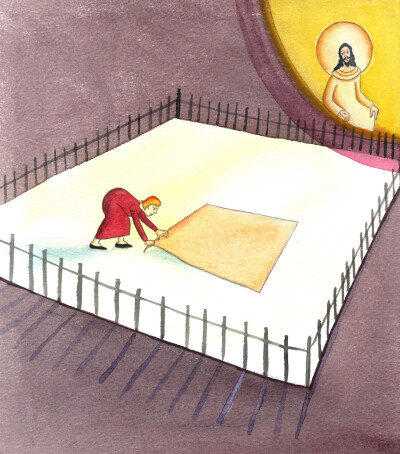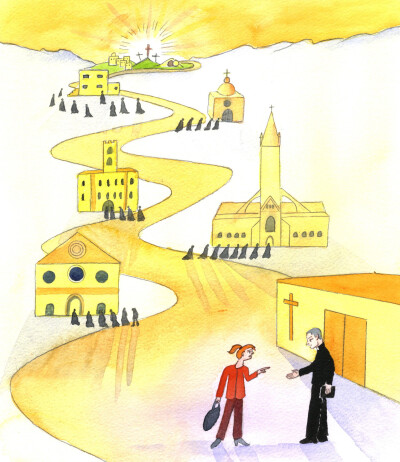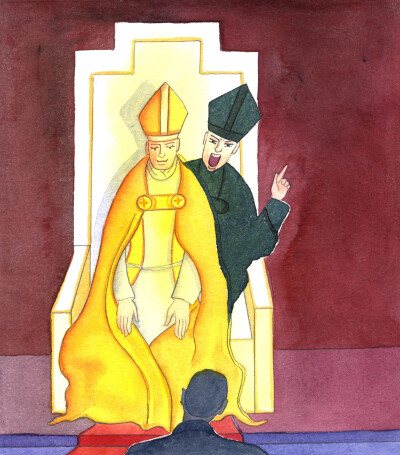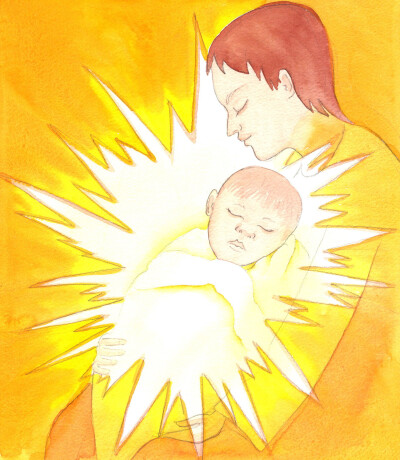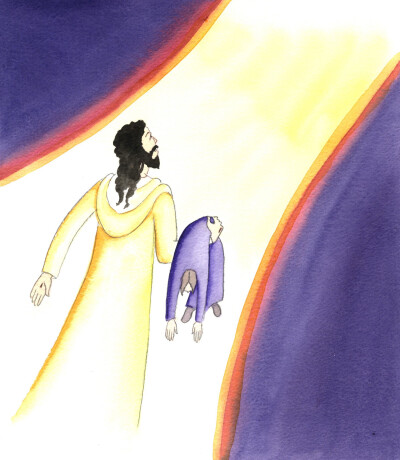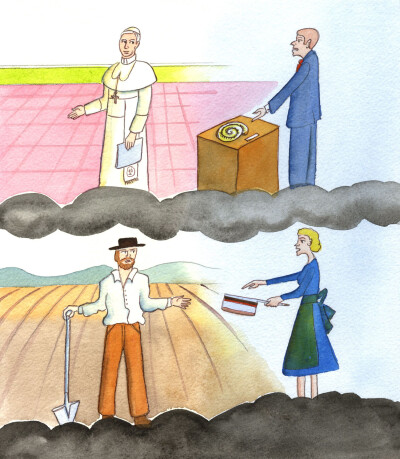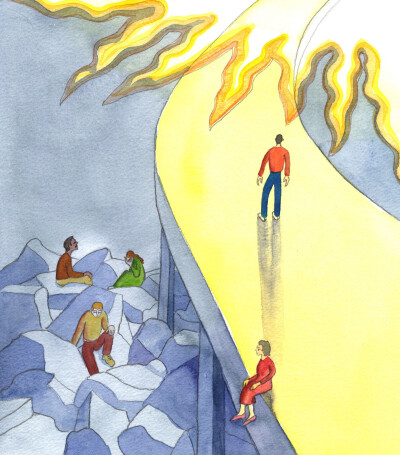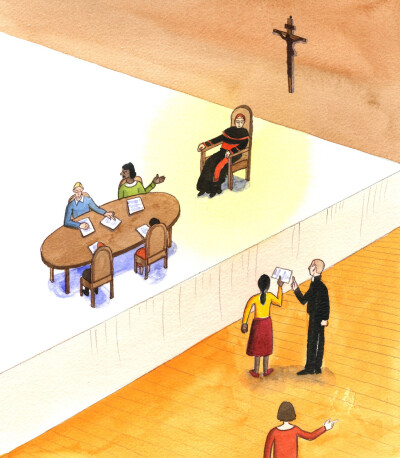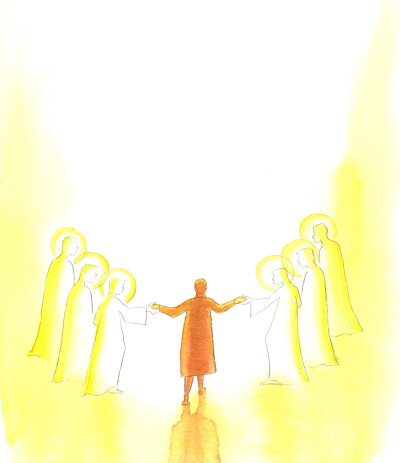Search Page
Showing 741 - 760 of 830
Christ looks down from Heaven, and notices the great silence in the Church, as few women show concern about their own contraceptive use, only a small number defend the Church's teaching on sexual morality, and many clergy are silent on the subject, preferring to preach about other less challenging issues.
St Paul was full of fervour, and ideas about how to spread the Gospel; yet Christ guided Saint Paul in specific ways, showing him what places to go to and which to avoid, with marvellous results. Yet Christ cannot guide Catholics today, to do great works, if they are not willing to obey Him in everyday matters, including morals, and if they ignore or argue about the Church's teachings.
We must take care not to halt the action of God in our lives. When a person refuses to do the plain Will of God, shown out in the constant teaching of the Church, it's as though she places a cloth on the ground, saying to God: 'This little enclave is yours. Don't come into my life any more. The rest of this area is mine". It is impossible for God to use people for great works who refuse to do the ordinary works.
When a Catholic disputes the teaching of the Church on sexual morality, and argues, insisting that the Church is wrong, it's as though that person is arguing with Christ, Who finds that He cannot invite her to undertake great work for Him; for how can He rely on someone to do difficult tasks if she has already refused to carry out His instructions in ordinary life, about sexual morality?
Christ wants us to reflect on what He sees, from Heaven. Christ sees a strange sight, today. In every century, people have accepted instruction in order to enter the Church and lead holy lives. Today, many are badly instructed; many continue with sinful practices; and in arguing with the Clergy about morals some make themselves unavailable for great work for Christ. How can they help Him in great things, if they will not obey in moral issues?
The Clergy sometimes, individually, make mistakes. We are right to respect the man and his office, and to accede to his wishes in the service of God, the Church and our neighbour. We should act with truth and charity towards him; but we are not obliged to believe the personal opinions he expresses if he is in error or offends against charity. A bishop in error confuses us by confusing two contradictory messages: his own, and also the one that he should embody as our Shepherd who guides, teaches and governs in the place of Christ.
None of us should think that a Baptism is merely an excuse for a ceremonial gathering. A real change is effected by the sacrament of Baptism, by which a person is freed from sin, made a child of God and a member of the Church, and receives the very life of God within his or her soul. The indwelling Trinity makes the soul glorious with Divine Glory; this is a light that can only be extinguished by serious sin.
When the Angels bow low, in awe, at the arrival of Jesus Christ, at the Consecration, they demonstrate, by their action, their interior disposition. We can do the same. We can express our adoration and love by reverent gestures, prayers, genuflections, and also by our silence in church, and our modest clothing, and dignified bearing.
It is a great grace for a lapsed Catholic to receive the Sacraments of the Church before death. This can change that person's eternal destiny, from being hopeless - if he or she was in a state of mortal sin - to being glorious. It's as if Christ carries that soul upwards, even if the soul must spend a while in Purgatory before reaching Heaven.
Christ has told the Church, through His Pope, our Pope Benedict, that priests are free to offer the Mass in the Extraordinary (Traditional) form; yet many Bishops have shown reluctance to welcome this instruction; or they still make it difficult for lay-persons to find such a type of Mass with its beauty and reverence.
We need not be surprised if enemies of the Church shout out their opposition to her on seeing the Pope, for example, as he pays a visit to another country. Even the Head of the Church, Jesus Christ, experienced opposition, mockery, and worse. But we must keep the Pope and all the Clergy - and the whole Church - in our prayers.
Catholics who work in mission and evangelisation can often be seen as calling out into the dark, in the heights of a great cavern, as they look down to the depths where many people are hiding away from God. Someone in this sort of Apostolate should have a burning desire to share the good news about God's love for us, about the forgiveness of sins, and about the graces made available through Christ and His Church, to bring us back to God and to prepare us for Eternity.
A Pope hands on the Faith, telling us what must be believed if we are to live, pray and love and teach to live as faithful Catholics. He can impose discipline, and even decide whom he permits to teach in the name of the Church; but it is no part of his task to speak 'outside' his area of competence, for example, to tell us what to believe about fossils. He is no more an expert on these matters not directly relevant to the Faith than a farmer is an expert on how to cook the produce from his fields.
Wise people recognise the truth that there are three states of life, in relation to Eternity. There are people already on the Way to Heaven: the bright Way made by Christ; and His Church calls all people to walk along it. Other people are in a gloomy, rocky area, not yet having found Christ, or not yet having put their trust in Him. And here and there, another state is seen, as someone is sitting on the edge of the Way to Heaven, temporarily overcome by inertia or lack of hope.
It is not enough for a bishop to rely on committees, in managing the education, catechesis and liturgical celebrations in his diocese, if this results in unorthodox statements or programmes being put forward, or irreverent or foolish liturgical practices. He has been given authority by Christ; and should step in, to ensure that everything is in accord with the 'Mind of Christ'
"Radiant Light" Images: These provide a sort of 'Catechism in pictures'. The purpose of 'Radiant Light' images is to cast light upon the teachings of the Catholic Church, to enable people of all places and backgrounds to see with clarity the most important truths of the Catholic Faith, to help them to enter or persevere on the one Way to Heaven, following our Lord and Saviour, Jesus Christ.
Christ is explaining to all who are called to be celibate priests that in their celibate state they can imitate Him, by His grace, not treating celibacy as a burden but a help to total self-donation to God, in the Church. They can be confident of receiving the necessary graces; and seminarians have the inestimable privilege of having Jesus Christ Really Present amongst them in the Blessed Sacrament of the tabernacle and altar.
In St. Joseph's shrine, in Missouri, for example, people of earlier centuries were immersed in Catholic imagery and culture. Absorbing it, they were helped to withstand the alien culture outside the places of worship. Today, we need to be so immersed; and since so many of our Catholic churches have been stripped bare of imagery, that is both inspiring and educational, God has provided both truth and beauty in the Radiant Light collection of pictures, in which anyone on-line can be immersed.
We should rejoice, if we have the relics of a Saint amongst us. We should ask for the prayers of the Saints, and receive their wonderful help, which is God's help poured through them. No matter how little-known some are, each Saint is now glorious in Heaven, and is a powerful intercessor for members of the Church: for those of us on earth, and for those in Purgatory.
When we turn to our friends, the Saints, to request their prayers for ourselves and our intentions, it's as if the Saints lead by the hand the one who prays, to bring her closer to God. It has been the delight of Christians, since the earliest days of the Church, to know that those who have gone before them, to Heaven, are alive in Christ, and praying for them.
Showing 741 - 760 of 830



